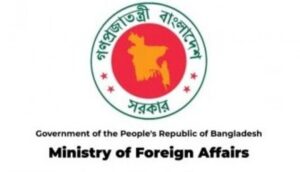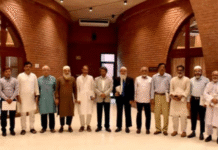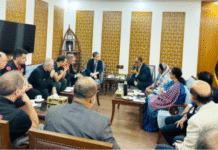 Questioning the intention of three United Nations Special Rapporteurs, Bangladesh on Tuesday said it seems that the SRs were ‘influenced by a desire to malign’ the government with ‘false and fabricated’ information on the human rights situation of the country.
Questioning the intention of three United Nations Special Rapporteurs, Bangladesh on Tuesday said it seems that the SRs were ‘influenced by a desire to malign’ the government with ‘false and fabricated’ information on the human rights situation of the country.
Responding to the OHCHR’s November 14 press release, the Ministry of Foreign Affairs said their one-sided observations appear as ill-intentioned particularly in the context of the government’s active engagement with them.
‘The press release compels the government to raise question about the motive and content of the observations made by three UN Special Rapporteurs,’ MoFA said.
They are Irene Khan, SR on the promotion and protection of the right to freedom of opinion and expression, Clement NyaletsossiVoule, SR on the rights to freedom of peaceful assembly and of association, and Mary Lawlor, SR on the situation of human rights defenders.
The timing of the press note containing the remarks of the SRs as well as their possible intentions was intriguing, MoFA said.
They came up with their remarks on the country’s human rights at a time when Bangladesh’s Universal Periodic Review has just been concluded on the previous day — November 13, 2023 and an overwhelming majority of countries appreciated Bangladesh for her key legislative, policy and institutional initiatives taken for advancing the enjoyment of human rights by its people while they made their recommendations, reads Bangladesh’s reply.
The content of the press note of the SRs is largely allegations against the government on the human rights situation of Bangladesh particularly on the current labour unrest, political violence, and other individual cases such as those of Professor Muhammad Yunus, Adilur Rahman Khan and Rozina Islam. ‘Bangladesh is a sovereign country where rule of law prevails. Accordingly, the three cases are being dealt with by law courts of the independent judiciary where the Government has no scope of intervention,’ MoFA said.
Specifically, regarding the case of Professor Muhammad Yunus, it needs mentioning that the case against him is of depriving the workers of a company owned by him of their rightful share of profit.
‘So it is surprising that the SRs are talking of the government violating human rights when the government is actually protecting labour and human rights,’ MoFA said.
Moreover, in the UPR session, while reiterating the government’s steadfast commitment to promote and protect human rights in the country, most of the issues raised by the SRs were clarified by the Bangladesh delegation.
Emphasising that implementation of human rights agenda is a work in progress, Bangladesh also assured the Human Rights Council that it would continue making efforts to implement the recommendations made by different countries.
‘Therefore, the government fails to understand what necessitated the issuance of such remarks by the SRs so hurriedly without allowing the government any time to reflect on the recommendations made during the UPR,’ MoFA said.
The government finds the conduct of the SRs totally incongruent with their respective mandates and selective.
The SRs are the part of the special procedures of the Human Rights Council who act on independently.
However, it is expected that they would use their mandates to report and advice on human rights to support governments in realising their human rights goals.
The government of Bangladesh expects the SRs to remain neutral and objective in carrying out their mandates as per the code of conduct.
Regrettably, MoFA said, this was not the case with the SRs who came up with such negative observations totally denying the sincere will and efforts of Bangladesh government to improve its human rights situation.
There were fourteen states that underwent UPR examination in the just concluded session of the Working Group on UPR in November 2023.
‘It is interesting to note that the SRs chose to issue a statement only on Bangladesh where again they remained silent on innumerable improvements as were appreciated by majority of the participating delegations in this peer review,’ MoFA said.
‘By doing so, they dishonoured their UN credentials as SR. They also misused the media centre of the office of the high commissioner for human rights to propagate their personal and biased views to reach a wider audience.’
The government of Bangladesh has welcomed the recommendations made by the member States of UN during the UPR in a constructive spirit.
The SRs have in a way undermined the recommendations and observations of the member States by making negative assessment of the same issues instantly after the UPR, MoFA said.
They went to the length of ‘urge (ing) the Human Rights Council and the international community to press upon Bangladesh the urgency and importance of ensuring a safe, open and conducive environment for free and fair elections,’ and sought to occupy a higher moral pedestal over member States and to influence adoption of the report of the Working Group.
‘Their urging the international community goes far beyond their call of duty. One of the three SRs is from Bangladesh and has recently been showing unprecedented level of enthusiasm in making critical observations while she maintains relative silence on other countries. By being so partial, biased, subjective and disproportionately focused, the SRs run the risk of losing their credibility and acceptance,’ MoFA said.
The government of Bangladesh underlined the importance it attaches to the role of special procedure mandate holders towards a well-functioning human rights mechanism.
‘While it hopes that the SRs would remain faithful to their mandates, it expects the office of the high commissioner for human rights to provide support to them to objectively fulfill their mandates and to remain careful of not being used as a platform of their subjective pronouncements,’ MoFA said.
New Age









